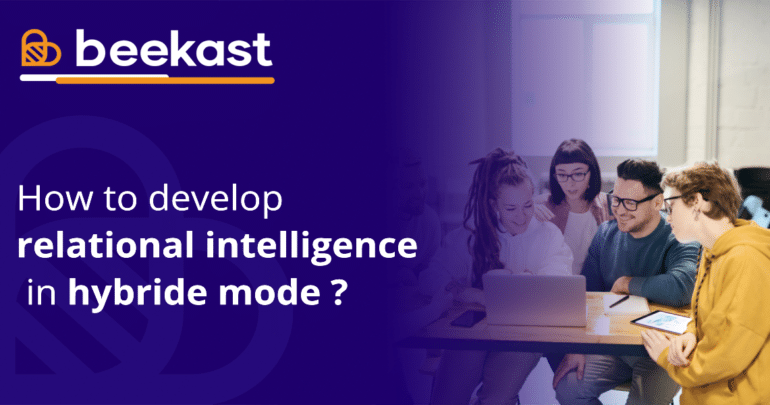Relational intelligence is defined as a set of skills that allow us to build relationships in a harmonious and sustainable way. Among these skills, we find emotional intelligence and mastery of communication.
In the realm of work, a key objective is to cultivate strong human connections and foster a deep sense of belonging to the company, thereby transforming employees into true brand ambassadors. This reinforcement is particularly vital in a hybrid work environment, as it helps to retain team members and keep them engaged.
According to a study conducted by LinkedIn Learning, companies are increasingly looking for “soft skills”, among which relational intelligence is found. What does it consist of and what is its importance in the workplace?
The principles of relational intelligence in hybrid mode
Cécile Gilbert Kawano, a specialist in relational and emotional intelligence coaching, highlights the interconnectedness of relational intelligence, emotional intelligence, and social intelligence. By using our emotions as valuable sources of information, emotional intelligence empowers us to meet our own needs effectively.
Social intelligence, on the other hand, enables us to consider the needs of others both within and beyond our immediate circles. It empowers us to establish meaningful connections and interact with our environment in a way that takes into account the needs of all parties involved while also honoring our own
Given that in the hybrid work model, the workplace may not be the same for everyone, this can be a hindrance to understanding the needs of people in our surroundings, and therefore activating our social intelligence.
Establishing a corporate culture based on relational intelligence facilitates interactions between colleagues, and as a manager, allows you to influence and inspire your teams.
Moreover, by using communication methods adapted to each team member, communication with them will be easier, which is particularly important in a hybrid work environment.
By possessing strong relational intelligence, one can facilitate the maintenance of good team cohesion through activities designed to strengthen bonds even when physically distant.
In order to develop this intelligence in a hybrid mode, managers must possess certain soft skills such as active listening and empathy. The implementation of certain best practices can also contribute to the development of relational intelligence in managers.
Best practices for developing relational intelligence in hybrid mode
Developing relational intelligence in a hybrid work environment can pose a challenge for managers, as it requires striking a balance between online and in-person interactions.
Furthermore, flex office makes the mission a bit more difficult, as employees’ workspaces are not always the same. To achieve this, we suggest implementing the following practices:
- Prioritize face-to-face communication when possible: in-person interactions allow better understanding of facial expressions and body language. Therefore, if face-to-face communication is not possible, we recommend using video conferencing tools with the camera on. Set up team rituals that allow you to keep in touch regularly with your teams.
Clear communication with team members is crucial. To achieve this, contextualize your requests and use simple, easily understandable language that is appropriate for your interlocutors to avoid any misunderstandings.
- Ensure the entire team is involved: when organizing hybrid meetings, make sure that all remote workers can hear and see what is happening in the room. Use the “Weather Report” activity to involve your entire team and gauge everyone’s mood. This activity will also help break the ice at the beginning of a meeting so that everyone is in a positive state of mind for participation and interaction.
- Practice empathy: always be sensitive to others’ needs and adapt your communication style accordingly. Don’t hesitate to listen and support any colleague who seems stressed or anxious. Hold weekly meetings to stay informed of their progress on their tasks and be able to address any roadblocks if necessary. Use the ready-to-use “Weekly Meeting” template to do this.
- Show flexibility: flexibility applies not only to work schedules but also to your behavior and approach to your team’s needs.
- Encourage collaboration: be open to new ideas brought by your collaborators and be ready to work as a team to find appropriate solutions. Show that you value their opinions by using the “Rocket” activity template, which allows you to determine the strategy and means to achieve the set goals together.
- Create a culture of trust: it is important that all members of your team feel comfortable expressing their opinions and ideas without fear of being judged. To this end, we suggest using the “Brainwriting” activity template, which will help everyone express themselves freely and openly discuss each other’s proposals.
- Use your emotional intelligence to resolve conflicts: this will allow you to move towards a “constructive confrontation”. This involves having an honest and direct discussion with the goal of identifying points of divergence and working together to find solutions.
Implementing these practices can be even more effective when coupled with the development of the following skills: perseverance and adaptability, firmness and flexibility, perspective and focus. By establishing a culture of relational intelligence in a hybrid work environment, employees can build stronger personal and professional relationships, facilitate interactions, and ultimately increase productivity.

